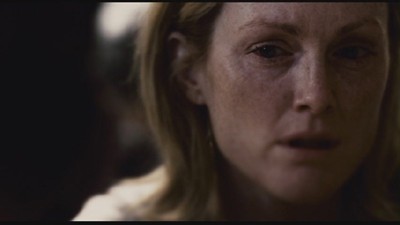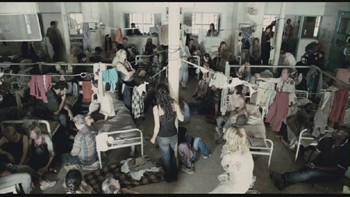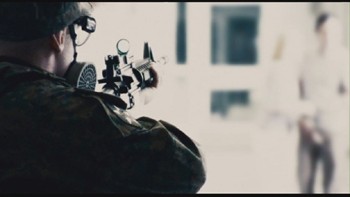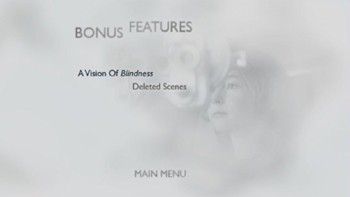| Reviews & Columns |
|
Reviews DVD TV on DVD Blu-ray 4K UHD International DVDs In Theaters Reviews by Studio Video Games Features Collector Series DVDs Easter Egg Database Interviews DVD Talk Radio Feature Articles Columns Anime Talk DVD Savant Horror DVDs The M.O.D. Squad Art House HD Talk Silent DVD
|
DVD Talk Forum |
|
|
| Resources |
|
DVD Price Search Customer Service #'s RCE Info Links |
|
Columns
|
|
|
Blindness
Miramax // R // February 10, 2009
List Price: $29.99 [Buy now and save at Amazon]
The Film:
 I'm glad that I was able to soak in Blindness within such close proximity to concentrating on The Exterminating Angel, because the two share many, many similarities that I wasn't expecting. Luis Buñuel's film takes on social class, capturing the essence of anarchy and societal downfall by way of an unexplainable phenomenon. It traps the victims in a location and forces them to fend for themselves, establishing a handful of rearranged social levels that arise once their status has been stripped. Blindness, based off of José Saramago's unsettling novel, latches onto these same principles with a different sort of eerie force tearing down its characters -- unexplained sightlessness. It becomes an equally disturbing and potent mystery in the hands of Constant Gardener and City of God director Fernando Meirelles, one that'll rattle your senses to a point of no relent.
I'm glad that I was able to soak in Blindness within such close proximity to concentrating on The Exterminating Angel, because the two share many, many similarities that I wasn't expecting. Luis Buñuel's film takes on social class, capturing the essence of anarchy and societal downfall by way of an unexplainable phenomenon. It traps the victims in a location and forces them to fend for themselves, establishing a handful of rearranged social levels that arise once their status has been stripped. Blindness, based off of José Saramago's unsettling novel, latches onto these same principles with a different sort of eerie force tearing down its characters -- unexplained sightlessness. It becomes an equally disturbing and potent mystery in the hands of Constant Gardener and City of God director Fernando Meirelles, one that'll rattle your senses to a point of no relent.
At times, however, that ruthlessness can get to be a bit much. It follows the lives of several individuals whom are nameless to us -- an optometrist (Mark Ruffalo, Zodiac), a sunglass-wearing prostitute (Alice Braga, I Am Legend) and the boy she's caring for, a weathered one-eyed man (Danny Glover, Lethal Weapon), a thief (Don McKellar,eXistenZ) and many others -- as they suffer from a condition that sends them into a state of disorienting blindness. It's not darkness, however, but a condition called the "white sickness", one that first falls on the eyes of a helpless man (Yusuke Iseya, Sukiyaki Western Django) as he's driving his car. As the unexplainable, prematurely-diagnosed epidemic begins to spread, the government jams each and every infected individual into a forgotten, dingy quarantine that's weak on supplies and maintenance. They're left to fend for themselves, only given a sparse supply of goods that they must divvy up within a self-governed environment, one that quickly transcends into depressing, animalistic chaos -- all photographed in shaky-cam, high-contrast grime by Meirelles' outstanding cinematographer, César Charlone.
There's one catch; one woman, the optometrist's wife (Julianne Moore, Children of Men), isn't blind, though she allows most of the policing soldiers and infected people to believe her to be so. She's the eyes and ears in Blindness, and what she witnesses is, needless to say, graphic; without any governing bodies, social stature, or presence of hope in this claustrophobic environment, it rapidly transforms into an adult-based, violent "Lord of the Flies" nightmare for the blind. Hedonism ensues, leading to random sexual encounters between filthy people who can only size their partners up by voice, scent, and the way their bodies feel. More importantly, desperation also floods the grimy quarantine ward, leading to fluctuating dominance structures that gauge purely on whoever is more aggressive or aggravated at the time. It all becomes a matter of primal indulgence and survival within the erratic box of a setting, one that quickly pivots once a bartender (Gael Garcia Bernal, Science of Sleep) -- somebody who has seen the sighted world's ugliness and self-absorbance -- shifts matters from bad to worse as he gathers a thuggish mob within his corner of the ward.
Fernando Meirelles aims to construct a scorn-filled environment in Blindness that's as hostile as possible, one that uses a lack of vision as a teardown of all but rudimentary structure. If nobody can see the color of one's skin or the clothing they wear, why succomb to basing judgment, right? As harsh as that concept sounds, that's actually the only truth that these people grasp in their world of blistering light. They stop caring about everything except the bare necessities of life, relegating them to a sea of starved, horny depressants that follow hand-in-hand to use the bathroom and shower themselves. Whether the portrayal is accurate or not is debatable, but the indie film director still presents us with a surprisingly vivid and frightening dystopia that allows no evidence of the outside world's existence to be seen -- excluding the word's steady stream of newly-blinded denizens. It becomes an allegory on this stilted paradigm that humanity has adopted, one that emphasizes physical projection as a measure of our internal self -- and a lack of it being a sort of strange freedom.
The fact that most of the focal characters get lost in Blindness' sea of grayed matter doesn't help to support the film, as the few identifiable people within the white blur are a mixed bag of partially-realized archetypes. Some exist on fairly tangible levels, like Mark Ruffalo's optometrist and Yusuke Iseya and Yoshina Kimura's combined strength as the "first" blind people, while others do more to rough up the sandpaper-like smoothness, such as Garcia-Bernal's weak turn as the hot-blooded anarchist. The only fully-competent and impressive outing comes from Julianne Moore, who gives us one lump of pulsating, throbbing muscle to hold onto as the scattered hopefulness in the story quickly washes down the drains. But it's not successful as a character film, partially because it operates so heavily around the dynamic of lost humanity and temperament -- which makes for an intriguing, yet troubling, portrait with very few identifiable entities.
Though Meirelles presents the material well, it suffers from one intentional problem: it spends too much time emphasizing the dirty, painful nature of the sightless ward's self-imposed ugliness to allow for Blindness' rays of distinct warmth to actually shine. There are some, mind you, especially once the film crawls towards a theme-based conclusion rife with double-meanings and theological contemplations, but you're got to brush off several layers of disheartening muck to reach them. Instead, it focuses on the single-toned dynamic that revolves around blindness becoming a gateway to self-sufficing desperation, a discomforting element further emphasized by an already-blind person's participation in the seedier corners of the ward's anarchistic stature -- something that speaks low for the gaunt humanity present in the film. Just as pitch-black as Battle Royale and A Clockwork Orange regarding the bitterness of dark humor and hedonistic whims, Blindness enters into a labyrinth of brash and filthy societal teardowns and stay lost in there for a very long time. Fernando Meirelles' complex adaptation is captivating and unsettling, but it's difficult to offer gratitude for its excessively bleak efforts.
The DVD:
Blindness comes from Miramax in a standard keepcase presentation with somewhat unfitting artwork. The menu design is unique; fully animated, it replicated the look of the impaired vision properties that the people suffer from in the film. It results in a novelty hide-and-seek search for the Setup, Scene Selection, and Special Features functions, which isn't all that difficult to do.
Video and Audio:
Curiously, Miramax opted against releasing Blindness in a high-definition Blu-ray presentation. After seeing how the hyper-contrast, overblown grittiness of the image looks in standard-defintion, it's easy to pick up on the reasoning. Presented in 1.85:1 anamorphic widescreen, the image exercises a strong level of detail/clarity competence and depth of field rendering that can be pretty surprising at times. Far-away details, like the weave of the ward's window closures, can even be defined, while skin texture and other fine elements exercise some of standard-definition's higher-tier strengths. An appropriate level of grain can be seen, while edge-enhancement and other distortive elements never mar the transfer's clarity. The dirty and hotly-lit visual composition in Blindness ranges in tan and gray shades amid the blooming light that never steers away from faulty contrast gradation, resulting in an ample image under any circumstances.
Miramax doesn't stop there; their English Dolby Digital 5.1 track is equally as surprising, showing a dynamic range and sprawling nature that offered quite a few surprising moments. Vocal clarity always sounds excellent, only getting raspy in a handful of situation, while the range of semi-thunderous sound effects that make their way into the picture exercise quite a bit of strength in the mid-range and higher-pitched levels. But the most impressive element in Blindness' aural track is Marco Antônio Guimarães' fantastic score, which completely envelops the viewer at nearly every moment of the film. It creates a buoyant environment that also allows emphasis on delicate surround sound elements to echo around the entire soundstage, resulting in a rather complete sound design. English and Spanish audio options are available, as are subtitle options in both languages.
Special Features:
A Vision of Blindness (55:30, Anamorphic):
Though this disc is light of extra by numbers, it sports one mammoth, well-executed one. Sitting at nearly an hour long, "A Vision of Blindness" follows the process of building Meirelles' film from the ground up. It shows how the director introduced the actors to the concept of blindness and transforming sounds and textures into visual elements, as well as finding the locales for which they want situate the blindness ward. It discusses the unique process of obtaining the right for the story from José Saramango, as well as the arduous process of piecing the film together. This documentary is almost completely in behind-the-scenes mode, blending casual interview time with Meirelles and his cast and crew with a slew of both direction-based and production-based footage that show the film gradually finding its way to the final product. It's in no hurry to condense the material for viewer's sake, as if it knows that more sober-minded film watchers will be absorbing the content. An outstanding featurette, it negates most of the need for any other forms of contextual supplements -- even though a streaming commentary from Meirelles would've been great. For convenience, "A Vision of Blindness" has been separated into twenty-five (25) well-segmented chapters.
Also included are a set of five Deleted Scenes (around 6 minutes), most of which are small snippets that would've extended some already well-drawn sequences.
Final Thoughts:
As a gut-wrenching portrayal of the potential anarchy that unexplainable sensory removal could cause, Blindness focus on giving life to the conflicts that could ensue while re-establishing structure and dominance within a tightly-confined environment. It's a difficult picture, adapted from a difficult novel, that churns around the unflinching nature of seeking meaning, finding satisfaction, and ultimately surrendering to societal cares amid a bizarre epidemic. However, it also focuses tightly on the grimy, soot-stained atmosphere and its maddening effects without placing enough emphasis on the intricate characters that we've got to latch onto in order to pull out of the conflict. Blindness is gripping and involving, but a little light on meaning behind its gratuity. Miramax makes certain to present this disc in tip-top condition, especially since they decided against a high-definition release at the time of this writing. Complete with a strong digital transfer and a whopper of a documentary about the making of the film, this is an easily Recommended package that'll serve as an admirable challenge to the senses with a littering of solid performances to justify the time.
Thomas Spurlin, Staff Reviewer -- DVDTalk Reviews | Personal Blog/Site
 I'm glad that I was able to soak in Blindness within such close proximity to concentrating on The Exterminating Angel, because the two share many, many similarities that I wasn't expecting. Luis Buñuel's film takes on social class, capturing the essence of anarchy and societal downfall by way of an unexplainable phenomenon. It traps the victims in a location and forces them to fend for themselves, establishing a handful of rearranged social levels that arise once their status has been stripped. Blindness, based off of José Saramago's unsettling novel, latches onto these same principles with a different sort of eerie force tearing down its characters -- unexplained sightlessness. It becomes an equally disturbing and potent mystery in the hands of Constant Gardener and City of God director Fernando Meirelles, one that'll rattle your senses to a point of no relent.
I'm glad that I was able to soak in Blindness within such close proximity to concentrating on The Exterminating Angel, because the two share many, many similarities that I wasn't expecting. Luis Buñuel's film takes on social class, capturing the essence of anarchy and societal downfall by way of an unexplainable phenomenon. It traps the victims in a location and forces them to fend for themselves, establishing a handful of rearranged social levels that arise once their status has been stripped. Blindness, based off of José Saramago's unsettling novel, latches onto these same principles with a different sort of eerie force tearing down its characters -- unexplained sightlessness. It becomes an equally disturbing and potent mystery in the hands of Constant Gardener and City of God director Fernando Meirelles, one that'll rattle your senses to a point of no relent. At times, however, that ruthlessness can get to be a bit much. It follows the lives of several individuals whom are nameless to us -- an optometrist (Mark Ruffalo, Zodiac), a sunglass-wearing prostitute (Alice Braga, I Am Legend) and the boy she's caring for, a weathered one-eyed man (Danny Glover, Lethal Weapon), a thief (Don McKellar,eXistenZ) and many others -- as they suffer from a condition that sends them into a state of disorienting blindness. It's not darkness, however, but a condition called the "white sickness", one that first falls on the eyes of a helpless man (Yusuke Iseya, Sukiyaki Western Django) as he's driving his car. As the unexplainable, prematurely-diagnosed epidemic begins to spread, the government jams each and every infected individual into a forgotten, dingy quarantine that's weak on supplies and maintenance. They're left to fend for themselves, only given a sparse supply of goods that they must divvy up within a self-governed environment, one that quickly transcends into depressing, animalistic chaos -- all photographed in shaky-cam, high-contrast grime by Meirelles' outstanding cinematographer, César Charlone.
There's one catch; one woman, the optometrist's wife (Julianne Moore, Children of Men), isn't blind, though she allows most of the policing soldiers and infected people to believe her to be so. She's the eyes and ears in Blindness, and what she witnesses is, needless to say, graphic; without any governing bodies, social stature, or presence of hope in this claustrophobic environment, it rapidly transforms into an adult-based, violent "Lord of the Flies" nightmare for the blind. Hedonism ensues, leading to random sexual encounters between filthy people who can only size their partners up by voice, scent, and the way their bodies feel. More importantly, desperation also floods the grimy quarantine ward, leading to fluctuating dominance structures that gauge purely on whoever is more aggressive or aggravated at the time. It all becomes a matter of primal indulgence and survival within the erratic box of a setting, one that quickly pivots once a bartender (Gael Garcia Bernal, Science of Sleep) -- somebody who has seen the sighted world's ugliness and self-absorbance -- shifts matters from bad to worse as he gathers a thuggish mob within his corner of the ward.
 |  |
Fernando Meirelles aims to construct a scorn-filled environment in Blindness that's as hostile as possible, one that uses a lack of vision as a teardown of all but rudimentary structure. If nobody can see the color of one's skin or the clothing they wear, why succomb to basing judgment, right? As harsh as that concept sounds, that's actually the only truth that these people grasp in their world of blistering light. They stop caring about everything except the bare necessities of life, relegating them to a sea of starved, horny depressants that follow hand-in-hand to use the bathroom and shower themselves. Whether the portrayal is accurate or not is debatable, but the indie film director still presents us with a surprisingly vivid and frightening dystopia that allows no evidence of the outside world's existence to be seen -- excluding the word's steady stream of newly-blinded denizens. It becomes an allegory on this stilted paradigm that humanity has adopted, one that emphasizes physical projection as a measure of our internal self -- and a lack of it being a sort of strange freedom.
The fact that most of the focal characters get lost in Blindness' sea of grayed matter doesn't help to support the film, as the few identifiable people within the white blur are a mixed bag of partially-realized archetypes. Some exist on fairly tangible levels, like Mark Ruffalo's optometrist and Yusuke Iseya and Yoshina Kimura's combined strength as the "first" blind people, while others do more to rough up the sandpaper-like smoothness, such as Garcia-Bernal's weak turn as the hot-blooded anarchist. The only fully-competent and impressive outing comes from Julianne Moore, who gives us one lump of pulsating, throbbing muscle to hold onto as the scattered hopefulness in the story quickly washes down the drains. But it's not successful as a character film, partially because it operates so heavily around the dynamic of lost humanity and temperament -- which makes for an intriguing, yet troubling, portrait with very few identifiable entities.
Though Meirelles presents the material well, it suffers from one intentional problem: it spends too much time emphasizing the dirty, painful nature of the sightless ward's self-imposed ugliness to allow for Blindness' rays of distinct warmth to actually shine. There are some, mind you, especially once the film crawls towards a theme-based conclusion rife with double-meanings and theological contemplations, but you're got to brush off several layers of disheartening muck to reach them. Instead, it focuses on the single-toned dynamic that revolves around blindness becoming a gateway to self-sufficing desperation, a discomforting element further emphasized by an already-blind person's participation in the seedier corners of the ward's anarchistic stature -- something that speaks low for the gaunt humanity present in the film. Just as pitch-black as Battle Royale and A Clockwork Orange regarding the bitterness of dark humor and hedonistic whims, Blindness enters into a labyrinth of brash and filthy societal teardowns and stay lost in there for a very long time. Fernando Meirelles' complex adaptation is captivating and unsettling, but it's difficult to offer gratitude for its excessively bleak efforts.
The DVD:
 |  |
Blindness comes from Miramax in a standard keepcase presentation with somewhat unfitting artwork. The menu design is unique; fully animated, it replicated the look of the impaired vision properties that the people suffer from in the film. It results in a novelty hide-and-seek search for the Setup, Scene Selection, and Special Features functions, which isn't all that difficult to do.
Video and Audio:
Curiously, Miramax opted against releasing Blindness in a high-definition Blu-ray presentation. After seeing how the hyper-contrast, overblown grittiness of the image looks in standard-defintion, it's easy to pick up on the reasoning. Presented in 1.85:1 anamorphic widescreen, the image exercises a strong level of detail/clarity competence and depth of field rendering that can be pretty surprising at times. Far-away details, like the weave of the ward's window closures, can even be defined, while skin texture and other fine elements exercise some of standard-definition's higher-tier strengths. An appropriate level of grain can be seen, while edge-enhancement and other distortive elements never mar the transfer's clarity. The dirty and hotly-lit visual composition in Blindness ranges in tan and gray shades amid the blooming light that never steers away from faulty contrast gradation, resulting in an ample image under any circumstances.
Miramax doesn't stop there; their English Dolby Digital 5.1 track is equally as surprising, showing a dynamic range and sprawling nature that offered quite a few surprising moments. Vocal clarity always sounds excellent, only getting raspy in a handful of situation, while the range of semi-thunderous sound effects that make their way into the picture exercise quite a bit of strength in the mid-range and higher-pitched levels. But the most impressive element in Blindness' aural track is Marco Antônio Guimarães' fantastic score, which completely envelops the viewer at nearly every moment of the film. It creates a buoyant environment that also allows emphasis on delicate surround sound elements to echo around the entire soundstage, resulting in a rather complete sound design. English and Spanish audio options are available, as are subtitle options in both languages.
Special Features:
A Vision of Blindness (55:30, Anamorphic):
Though this disc is light of extra by numbers, it sports one mammoth, well-executed one. Sitting at nearly an hour long, "A Vision of Blindness" follows the process of building Meirelles' film from the ground up. It shows how the director introduced the actors to the concept of blindness and transforming sounds and textures into visual elements, as well as finding the locales for which they want situate the blindness ward. It discusses the unique process of obtaining the right for the story from José Saramango, as well as the arduous process of piecing the film together. This documentary is almost completely in behind-the-scenes mode, blending casual interview time with Meirelles and his cast and crew with a slew of both direction-based and production-based footage that show the film gradually finding its way to the final product. It's in no hurry to condense the material for viewer's sake, as if it knows that more sober-minded film watchers will be absorbing the content. An outstanding featurette, it negates most of the need for any other forms of contextual supplements -- even though a streaming commentary from Meirelles would've been great. For convenience, "A Vision of Blindness" has been separated into twenty-five (25) well-segmented chapters.
Also included are a set of five Deleted Scenes (around 6 minutes), most of which are small snippets that would've extended some already well-drawn sequences.
Final Thoughts:
As a gut-wrenching portrayal of the potential anarchy that unexplainable sensory removal could cause, Blindness focus on giving life to the conflicts that could ensue while re-establishing structure and dominance within a tightly-confined environment. It's a difficult picture, adapted from a difficult novel, that churns around the unflinching nature of seeking meaning, finding satisfaction, and ultimately surrendering to societal cares amid a bizarre epidemic. However, it also focuses tightly on the grimy, soot-stained atmosphere and its maddening effects without placing enough emphasis on the intricate characters that we've got to latch onto in order to pull out of the conflict. Blindness is gripping and involving, but a little light on meaning behind its gratuity. Miramax makes certain to present this disc in tip-top condition, especially since they decided against a high-definition release at the time of this writing. Complete with a strong digital transfer and a whopper of a documentary about the making of the film, this is an easily Recommended package that'll serve as an admirable challenge to the senses with a littering of solid performances to justify the time.
|
| Popular Reviews |
| Sponsored Links |
|
|
| Sponsored Links |
|
|
| Release List | Reviews | Shop | Newsletter | Forum | DVD Giveaways | Blu-Ray | Advertise |
|
Copyright 2024 DVDTalk.com All Rights Reserved. Legal Info, Privacy Policy, Terms of Use,
Manage Preferences,
Your Privacy Choices | |||||||














